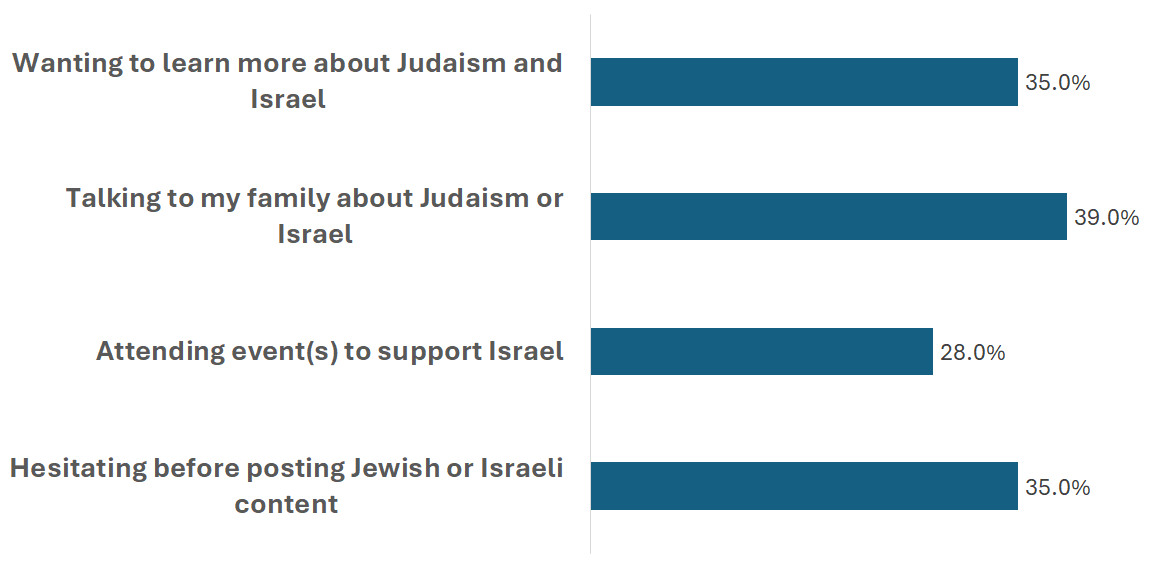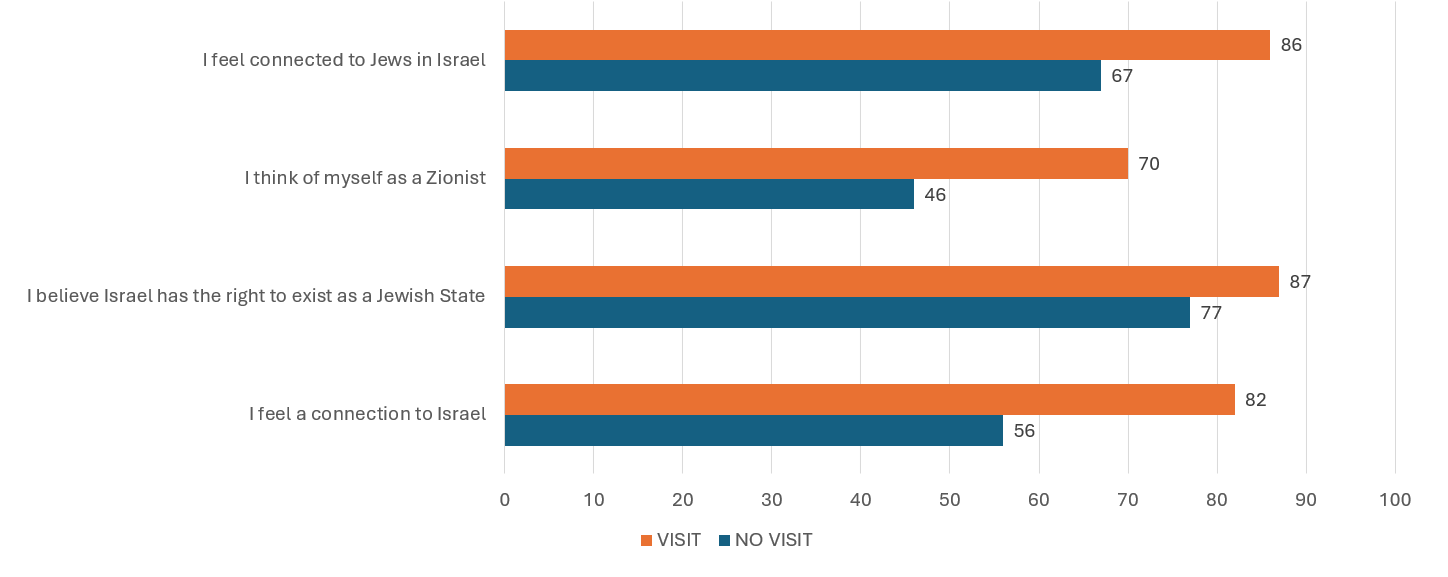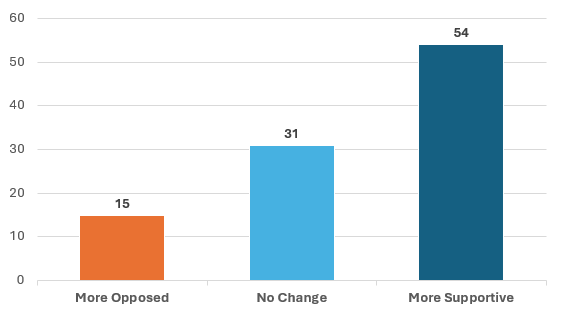Introduction
This report presents findings from a global survey of Jewish teens aged 14-18, conducted in the wake of the events of October 7. The focus of this report is Jewish teens’ connection to Israel and views on the war; the larger survey also aimed to capture concerns about rising antisemitism and understand the role of Jewish Identity.
Developed in collaboration with the Tovanot Institute, the survey was published online and promoted by JMG, a PR firm specializing in targeted ads in areas with significant Jewish populations. Of the 1,600 responses collected, approximately half were excluded due to incomplete, duplicate, or suspicious entries, or because participants fell outside the target age range. To further ensure quality, the final sample, consisting of eighty percent American teens, was rigorously reviewed on an individual basis.
The final sample included Jewish teens with varying levels of engagement, determined by their participation in Jewish activities and lifecycles. Forty percent of the sample fell into the "low" category, indicating no to little involvement in Jewish activities, while the remainder were split into medium and high categories.
Emotional Attachment to Israel
The overwhelming majority (94%) of Jewish teens feel some level of emotional attachment to Israel. Of that, the majority, 55%, feel very or extremely emotionally attached to Israel while 39% feel slightly or moderately attached.


In examining the breakdown of emotional attachment by location, age, and Jewish background, one can see differences between the United States and other countries, as well as between groups with different Jewish backgrounds.

Post October 7 Behavioral Changes Related to Israel

Following October 7, Jewish teens reported changing their behavior in various ways. 39% reported that they now talk to their family more about Judaism and Israel, 35% reported they now want to learn more about Judaism and Israel, and 28% reported that they attended events to support Israel. Additionally, 35% reported that they now hesitate before posting Jewish or Israeli content online.
General connection to Israel
Respondents’ viewpoints regarding their attachment to Israel were examined by different statements, with a higher average testifying to a stronger attachment. All statements received high support.

When broken down by country, age, and Jewish background, some important trends emerge. The viewpoints of respondents from the United States were less positive than those of respondents from other countries, while the views of 18-year-olds were more positive than those of the younger age groups. Moreover, the views of respondents with high Jewish background scores were more positive than those with lower Jewish background scores.
Views on the war

In addition to connection to Israel, respondents' views on the war were examined. In response to the statement, "I believe that Israel is committing genocide in Gaza," 46% of teens disagreed, 36% agreed, and 17% neither agreed nor disagreed. When asked about sympathizing with Hamas, 56% did not agree, 32% agreed, and 12% neither agreed nor disagreed.
There was a strong expression of sympathy for the Palestinian people, with 64% agreeing with this statement, 17% disagreeing, and 18% remaining neutral.
Significant differences emerged based on country, age, and Jewish background in responses to the questions about Hamas and genocide. Notably, 65% of Jewish teens with low levels of Jewish background agreed with the statement, "I sympathize with Hamas," compared to only 6% of those with high Jewish backgrounds. Additionally, 37% of American teens agreed with this statement, while only 7% of teens from other countries did. Age also influenced responses: 60% of 14-year-olds agreed, contrasted with just 9% of 18-year-olds.
Interest in Visiting Israel

Impact of Visiting Israel on General Connection

Those who visited Israel had an overall and substantial increase in connection to Israel than teens who had never visited Israel.
Impact of ‘Mifgashim’
To explore the impact that interpersonal relationships with Israelis have on Jewish teens in the Diaspora, we first assessed how many had family or friends in Israel, which we loosely termed mifgashim. The impact of these interpersonal connections was vast and widespread.

One of the greatest impacts that mifgashim had was on views on the war. Those who had experienced mifgashim were 47% points less likely to believe Israel is committing genocide in Gaza and 44% points less likely to express sympathy for Hamas.

Support for Israel Post October 7

Most participants (54%) reported that they had become more supportive of Israel in the wake of October 7th while 32% reported no change, and 15% reported they had become more opposed.
As with many of the questions, significant differences in location, age, and Jewish background were seen.
Conclusion
The findings of this survey highlight the complex and varied connections that Jewish teens worldwide are connected to Israel, particularly in the context of October 7th and the subsequent war. An overwhelming majority maintain a strong emotional attachment to Israel, with many expressing enhanced interest in Jewish and Israeli topics. However, perspectives on the conflict and views toward Hamas and the Palestinian people reveal significant diversity, influenced by factors such as age, geographical location, and Jewish background. Younger teens, American teens, and those with lower Jewish engagement levels reported higher levels of sympathy for Hamas and more critical views on Israel's actions, in contrast to their older, internationally based, and highly engaged counterparts.
Additionally, interpersonal relationships, such as mifgashim, seem to play a pivotal role in shaping opinions, underscoring the importance of direct connections between Diaspora teens and Israelis. This data suggests that programs fostering these connections are instrumental in deepening support and understanding of Israel among Jewish teens globally. The survey results ultimately reflect both a shared foundation of Jewish identity and connection to Israel, as well as the need for nuanced approaches to meaningful engagement with Jewish teens, considering their distinct backgrounds and perspectives.



